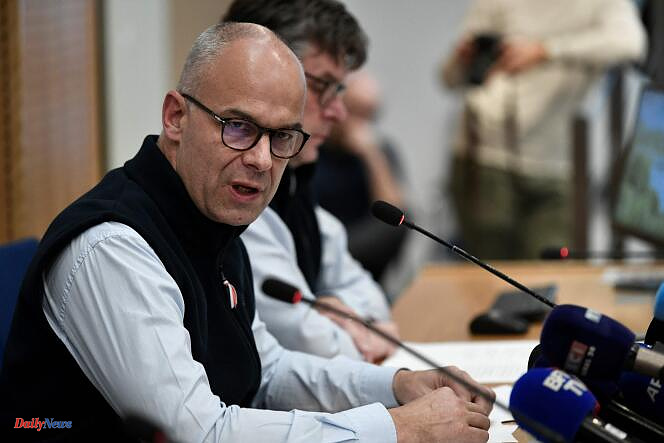The majority unions, the National Federation of Farmers' Unions (FNSEA) and Young Farmers (JA), called on Thursday February 1 to suspend the blockades of farmers in France in view of the announcements by Prime Minister Gabriel Attal.
“We have decided that at present, in view of everything that has been announced (…), we need to change our modes of action and therefore we are calling on our networks (…) to suspend the blockades and to enter into a new form of mobilization,” explained the president of the JA, Arnaud Gaillot, alongside the boss of the FNSEA, Arnaud Rousseau, during a press conference in Paris at the FNSEA headquarters.
The objective now is that the farmers at the blockage points “retreat in good order to return to the farms in complete safety” and that “this return journey takes place in the best conditions. It’s a concern, so as not to relive what began last week with this drama in Ariège,” insisted Arnaud Rousseau, referring to the death of a farmer and her daughter on a dam. Regarding “places where people will not want to leave, (…) we will explain it to them,” he said.
“From Monday, we will get to work in the prefectures, in the ministries, to work on all the points that have been announced, to see how we implement them, how we make it really come to fruition on the field", added, for his part, the president of the JA, Arnaud Gaillot.
“We need action.”
“At the moment, we have been heard on a certain number of points, with tangible progress,” continued Mr. Rousseau. “But there are also things that are not there and that will need to be clarified,” he added. “We need action, we need concrete things. Farmers don't just want words. (…) We must now transform the test,” he continued.
The boss of the FNSEA said in particular that he was “sensitive to the announcement of emergency measures concerning GNR [non-road diesel], health and climate compensation, and the rapid payment of the latest aid” paid by the CAP . The president of the largest agricultural union also welcomed the fact that Mr. Attal had reiterated a course, “that of sovereignty, that of production and an agricultural policy that takes responsibility”.
The unions set several conditions for not resuming the movement: “first results” by the Agricultural Show (February 24 to March 3), then the adoption of a law of orientation and future agricultural, as well as European measures by June. “If by the month of June, these markers are not met, we will not hesitate to re-enter a general mobilization movement,” declared Mr. Gaillot.
The two officials called for a summary document putting in writing all the government's announcements. “There, now, right away, we want it to be written, that's it, because the guys on the ground, they want to see. (…) The guys won’t move until they have it,” added Mr. Rousseau. He warned against any attempt at “smoke-mongering”.
Before the Agricultural Show, “we have fifteen days to see if all this is serious, it’s credible, it holds water,” insisted Arnaud Rousseau.
The head of the FNSEA generally praised the “listening” of the Prime Minister, Gabriel Attal, “to try to understand what our issues are, to receive us, to exchange, to discuss and, finally, to announce in several bursts emergency measures”. “At the same time, we question the deafness of Europe,” he added, referring to “the growing incomprehension between a technostructure walled in its offices in Brussels and the realities of what we experience in our holdings”.
Strengthening EGalim laws
Shortly before, Mr. Attal, for his third round of announcements in a week, listed measures which, according to him, meet “a large part of the expectations” of farmers and are “likely” to calm the protest.
“We want to be sovereign, sovereign to cultivate, sovereign to harvest, sovereign to feed ourselves,” he summarized, promising to include “the objective of [food] sovereignty in the law” and to enshrine “in the rural code agriculture as a fundamental interest of the nation”.
Among Thursday's announcements is a strengthening of the EGalim laws which aim to prevent producers from bearing the brunt of the fierce price war between supermarkets on the one hand, and distributors and suppliers of the agro-industry on the other. The Minister of the Economy, Bruno Le Maire, specified that “all major supermarket chains” would be “controlled in the coming days”.
Mr. Attal also announced an envelope of 150 million euros in tax and social support for breeders. Mr. Le Maire had already announced a tax exemption measure for cattle breeders in October. But the National Bovine Federation (FNB) expressed last week an “extremely strong disappointment” from breeders on this subject.
To facilitate the renewal of generations, Gabriel Attal also announced the raising of the exemption thresholds on agricultural inheritances.
He pledged to relax the rules on meadows and said he wanted to prevent the importation into France of fruits and vegetables treated with the insecticide thiacloprid, banned in Europe.
On phytosanitary measures, the government also let go, promising in particular that the Ecophyto plan, aimed at reducing the use of pesticides, would be “paused”.
He also asked that the question of limiting Ukrainian grain imports into the European Union be included in a negotiation. The EU has not included cereals in a list of “sensitive” products on which imports can be curbed.
The question now is whether farmers on the ground will respond to instructions, especially since many of the demonstrators are not unionized.












